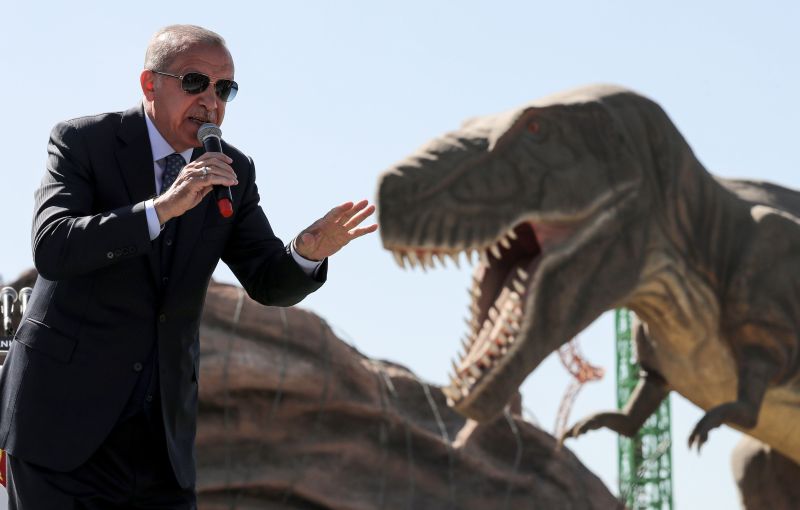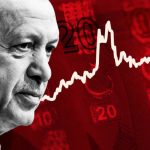Turkish President Recep Tayyip Erdogan delivers a speech next to a model dinosaur during the opening ceremony of the Wonderland Eurasia theme park in Ankara on March 20, 2019. (Adem Altan/AFP/Getty Images)
Turkey’s president has rarely been so unpopular. He’s likely to dominate this week’s local elections anyway.
No one ever prospered by predicting Turkish President Recep Tayyip Erdogan’s political demise, but on the eve of Turkey’s local elections this weekend, he and his Justice and Development Party (AKP) seem weaker than ever. If he were not feeling political pressure, he would not be featuring the grotesque video of the Christchurch mosque massacre at campaign rallies, nor would he be accusing the opposition of supporting those who want to divide Turkey. His interior minister would not be loudly touting the fact that Turkey defied the United States when it invaded Syria and took over Afrin. Hammering away at Western Islamophobia, the perfidy of the main opposition party, and resistance to the United States are excellent ways to mobilize the Turkish electorate to support AKP candidates in the upcoming municipal elections.
The 81 cities and almost 1,000 towns whose mayoralties are in play on March 31 are crucial because controlling cities and towns means controlling the patronage that keeps the AKP machine going—why would any business leader continue to curry favor with the AKP if some mayor from another party is in charge? Heightening Erdogan’s anxiety is the recent raft of awful economic news: The economy is in recession, inflation is at 20 percent, unemployment is at 13.5 percent (youth unemployment is 12 points higher), and per capita GDP has fallen. Even so, given Erdogan’s political skills, the AKP’s willingness to rig the outcome, the weakness of the party’s opponents, and the lack of courage among the would-be opposition, the ruling party will likely enjoy another victory.
Erdogan is a great politician. That should be obvious to anyone who has followed the man’s political career. The way he used the footage of the New Zealand massacre at election rallies last week was a horrifying and cheap political tactic, but it was also brilliant. It allowed Erdogan to highlight and reinforce ideas about Muslim solidarity, Turkish leadership, and an unredeemable West that have long been part of his and the AKP’s political repertoire. He clearly understands better than most that political appeals based on identity may have the power to overcome even bad economic news. Last year, as the government’s economic mismanagement led to a precipitous slide in the value of the lira and analysts were predicting that Erdogan would have to go to the IMF for help, the Turkish leader blamed the United States and appealed to God, making it a nationalist and religious virtue to oppose the logic of the markets. The episode arguably strengthened Erdogan, at least in the short run. That’s why a little more than a week before the 2019 elections, Erdogan askedTurks, “Why is the West silent? Why is the Western media silent? Because they … prepared it [the terrorism suspect’s manifesto] and handed it to him.” He then warned New Zealanders and Australians that if they visited Turkey, they, like their grandfathers in World War I, would be returned in coffins.
Even if Erdogan’s appeal for votes on the graves of 50 fellow Muslims does not work, there is every reason to believe that the AKP will do whatever it takes to ensure the outcome is in their favor. The most recent example of the party’s electoral chicanery occurred in April 2017, when Turks were asked to approve constitutional changes giving Erdogan new powers. When it became clear that the Yes camp might lose, the party and its agents made sure that, in contravention of the AKP’s own electoral reforms, uncertified ballots were counted. In the November 2015 general election—a rerun of elections held in June 2015, the results of which Erdogan did not like—international observers reported that while voting was problem-free, the AKP, its supporters, and the government engaged in intimidation and even violence against the opposition. A year earlier, the opposition credibly charged that the ruling party tampered with the results of Ankara’s mayoral election, influencing the race in favor of its candidate.
An often-overlooked aspect of the AKP’s almost two-decades-long dominance of Turkish politics are the benefits associated with campaigning against a perennially bungling opposition. It is true that the Republican People’s Party (CHP) candidate for mayor of Istanbul is running close in the polls against the former prime minister and Erdogan yes man Binali Yildirim. In Ankara, it looks even better for CHP’s Mansur Yavas. These races are outliers for a party that has suffered from the predation of the AKP, which has vastly altered Turkey’s media landscape in its favor and used the power of the state apparatus to its advantage. At the same time, the party’s leaders cannot seem to find a message despite the abundance of issues on which to attack the AKP and offer a better future for Turks.
In the summer of 2017, in what was no doubt a stroke of dumb luck, CHP party leader Kemal Kilicdaroglu actually hit on an a potentially winning political issue when he began a March for Justice to protest the jailing of a party member and former journalist. As Kilicdaroglu wended his way from Ankara to Istanbul, he attracted tens of thousands of followers and significant media attention. And after 25 days and 280 miles, he triumphantly entered Turkey’s largest and most politically important city—an AKP stronghold—to cheering crowds. Then, after Kilicdaroglu’s supporters dispersed, absolutely nothing happened. Zero. Since no one is against justice, the march should have been the beginning of a campaign to restore the rule of law, due process, and end corruption, but Kilicdaroglu and his deputies could not manage it even after the success of his momentarily inspiring trek. As a result, the CHP, which was Ataturk’s party, has become little more than a regional party centered on Turkey’s Aegean coast that can reliably count on 20 to 25 percent total national support.
As for the other parties, the Iyi Parti, or Good Party, was supposed to save Turkey from the AKP in the last round of general and presidential elections but significantly underperformed, gaining control of only 43 seats in Turkey’s 600-seat parliament. The Peoples’ Democratic Party has been the target of government repression for years. Most of its leadership is in jail for allegedly supporting terrorism, a politically expedient but reckless charge for the AKP to make given that the party grew out of the Kurdish community, though its base extends beyond Kurds.
Erdogan and the AKP also enjoy an advantage because the one group of people who might be able to challenge them have proved to be cowards. Periodically, stories bubble up from the Turkish rumor mill indicating that former President Abdullah Gul will emerge from retirement to challenge his onetime political partner, but the Turkey-watching community has learned to roll its eyes at these feints. Recent stories about a party potentially including Ahmet Davutoglu—who served as Erdogan’s foreign-policy advisor, foreign minister, and prime minister—along with Ali Babacan, a former deputy prime minister and minister of state responsible for the economy, and other AKP stalwarts whom Erdogan purged might be welcome news to Turkish voters, if true. The problem is that Davutoglu and company will not commit to anything until they see the results of the local elections. Apparently, principles matter so long as AKP only wins by a small margin. In that case, they might as well not form a party, because they wouldn’t even be needed.
Erdogan certainly seems weaker than at any other time in the last almost 17 years, but that does not mean he is at risk. He and the AKP have controlled Turkey for almost two decades, and as a consequence, they control the press, control state resources, and control the political process at every level. So Turks can fairly ask themselves, “Is there an alternative?” The answer is a resounding no. The Turkish president is running hard and saying shocking things because he is an outstanding politician. He treats every election like it is his last and he is 10 points down in the polls with a week to go. It is tempting to wager on an AKP loss. Observers have been predicting the party will get its comeuppance or that it will split for at least the three elections. It may yet happen, but not this time around, and so the transformation of Turkey continues.
Source: FP



